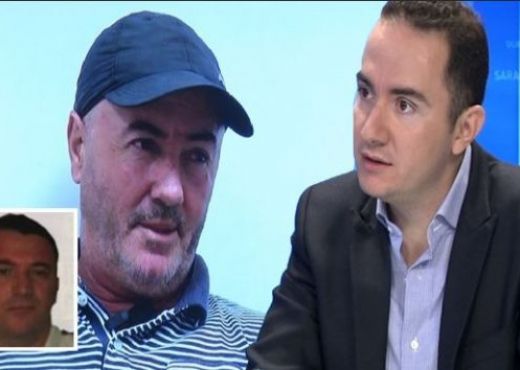
The “Babale” case, also known as the Agron Xhafaj wiretapping scandal, centers around accusations of drug trafficking involving Agron (Geron) Xhafaj, the brother of Fatmir Xhafaj, Albania’s former Minister of the Interior. The case gained widespread media attention in 2018 after a covert audio recording surfaced, allegedly implicating Agron Xhafaj in ongoing drug trafficking operations while his brother held a high-ranking government position.
The Key Players
1. Ervin Salianji – A Member of the Albanian Parliament from the Democratic Party (PD), who publicly denounced Agron Xhafaj.
2. Agron Xhafaj – Brother of Fatmir Xhafaj, previously convicted in Italy for drug trafficking. At the time of the scandal, his brother Fatmir was the Interior Minister of Albania.
3. Albert Veliu (“Babalja”) – A former speedboat driver involved in drug smuggling. He became the central figure in the audio recording, allegedly exposing Agron Xhafaj’s involvement in drug trafficking.
4. Jetmir Olldashi – A journalist who recorded Veliu’s testimony and played a significant role in the investigation.
5. Fredi Alizoti – A controversial witness who later claimed that his voice was used to impersonate Agron Xhafaj in the recordings.
The Audio Recording
In May 2018, Ervin Salianji and the Democratic Party publicly released an audio recording, which purportedly featured a conversation between Albert Veliu and Agron Xhafaj. In the recording, Veliu, known as “Babalja,” discusses arrangements for trafficking cannabis from Albania to Italy, with “Agron” allegedly providing logistical support. The recording, said to have been captured in a bar in Vlora, raised serious allegations that Agron Xhafaj was actively involved in drug smuggling while his brother was in office.
The recording quickly went viral, causing a political earthquake in Albania, as it implicated the brother of a senior government official in criminal activities. Salianji and the Democratic Party framed the case as emblematic of the ruling Socialist Party’s corruption and criminal ties, particularly in the context of Albania’s efforts to join the European Union.
Government and Legal Response
Following the release of the tape, Agron Xhafaj immediately left Albania and returned to Italy to serve the remainder of his prison sentence for drug trafficking from a previous conviction. The Albanian government, led by Prime Minister Edi Rama, dismissed the recording as a fabrication and insisted it was part of a politically motivated smear campaign aimed at destabilizing the government.
Fatmir Xhafaj, the Interior Minister, denied any knowledge or involvement in his brother’s activities and refused to resign at the time. However, Fatmir Xhafaj eventually stepped down from his position a few months later in October 2018, though the resignation was officially attributed to unrelated political developments.
Doubts About the Recording
Shortly after the release of the audio, suspicions arose regarding its authenticity. The government claimed the recording had been doctored, and a new witness, Fredi Alizoti, came forward, stating that he had impersonated Agron Xhafaj’s voice in the tape. This created significant confusion about whether the recording was real or an elaborate setup to frame Agron Xhafaj.
Alizoti later testified that he had been promised money by Albert Veliu and Salianji to falsely claim that he was part of the conspiracy. His testimony effectively shifted the narrative, portraying the entire case as a political ploy orchestrated by the opposition to damage the government’s credibility.
Court Proceedings and Sentencing
In the ensuing months, legal proceedings were initiated against various individuals involved in the case. While the Democratic Party and Salianji maintained that the wiretap was authentic, the court found the evidence insufficient and ruled that Salianji had spread false information.
In 2021, Salianji was sentenced to one year in prison for defamation and fabricating evidence, a ruling that was upheld by the Court of Appeals in 2024. Journalist Jetmir Olldashi was also sentenced to six months of probation for his role in the case. The court argued that the entire operation, which implicated Agron Xhafaj, was staged and that Salianji had knowingly participated in misleading the public.
Political Implications
The “Babale” case has had deep political repercussions in Albania. It became a symbol of the contentious relationship between the ruling Socialist Party and the opposition Democratic Party. For the opposition, the case represented a broader fight against government corruption and organized crime, which they claimed was being protected by those in power. For the government, it was portrayed as an example of the opposition’s willingness to resort to fabrications to destabilize the country.
The case also drew attention to the broader issue of the influence of organized crime in Albania and the country’s struggle with judicial reforms, particularly in light of its aspirations to join the European Union. The scandal underscored concerns about the independence of Albania’s judicial system, as critics accused the courts of being influenced by political pressure.
Conclusion
The “Babale” case remains one of Albania’s most controversial political scandals. It involved secret recordings, allegations of drug trafficking, and claims of witness tampering and fabrication. While Ervin Salianji has continued to assert his innocence and has vowed to fight the verdict, the ruling underscores the complexities of Albania’s political landscape and the challenges it faces in separating politics from the judiciary. The case’s legacy will likely continue to impact Albanian politics for years to come, particularly as debates over corruption, justice, and media freedom continue.
